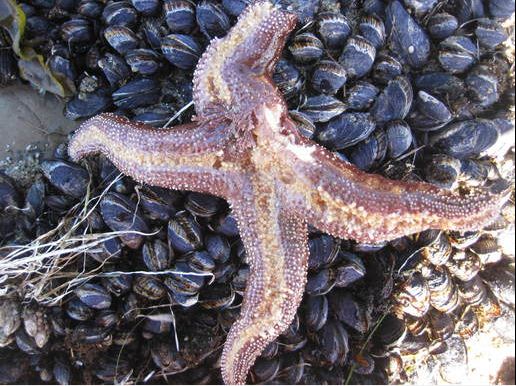
A diseased seastar. (Nate Fletcher / Pacific Rocky Intertidal Monitoring Lab)
Up and down the West Coast, starfish are dying.
By Deborah Netburn
February 4, 2014 LATimes
Casualties of a mysterious disease known as seastar wasting syndrome, they are dying in Alaska, deteriorating in San Diego and disappearing from long stretches in between.
Death from the disease is quick and icky. It begins with a small lesion on a starfish’s body that rapidly develops into an infection the animal cannot fight.
Over the course of the disease the starfish’s legs might drop off, or even separate from the body and start to crawl away, as you can see in the PBS news story below.
Pete Raimondi, a professor at UC Santa Cruz who has been tracking the seastar crisis, said a starfish’s leg moving away from its central disk is akin to a lizard’s tail continuing to wriggle even after it has snapped off the lizard’s body.
“Starfish don’t have a central nervous system, so it’s not like if you chopped off your arm,” he said. “The arms can still be mobile and operate on their own for a period of time – longer than you think.”
The seastar wasting epidemic was first observed last summer. Some wondered whether radiation that leaked into the Pacific Ocean from the Fukushima nuclear plant in Japan might be the cause.
“I think it is almost entirely impossible to be related to Fukushima,” Raimondi told the Los Angeles Times. “We haven’t ruled it out, but there are so many more likely things going on. And there is no evidence that radiation has gotten to California.”
A more likely culprit is a pathogen. Either a virus, parasite or bacteria infects the animal and compromises the immune system, which leads to a secondary bacterial infection that ultimately kills the animal.
Raimondi said it shouldn’t be long before scientists isolated the responsible pathogen. “We should know pretty soon,” he said.
